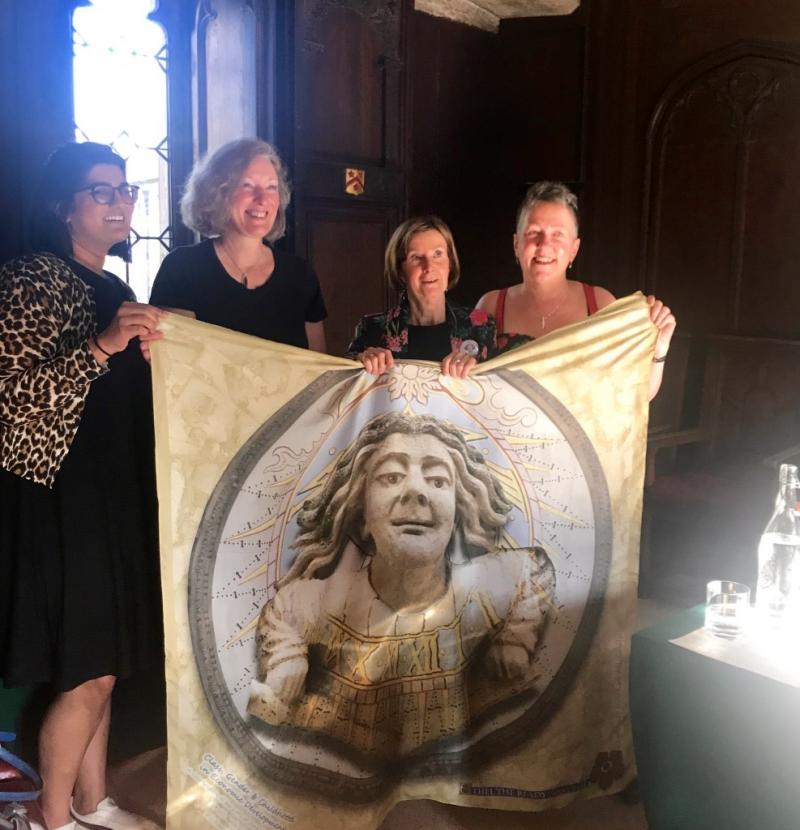Class, Gender & Childhood in economic development - A celebration of the work of Jane Humphries
Class, Gender and Childhood (19th to 20th April, All Souls, Oxford) brought together scholars in economic and social history from around the globe to celebrate the career and work of Professor Jane Humphries.
Opening the two-day conference, Professor Deborah Oxley, who organised the event with Dr Sara Horrell (Cambridge) and Dr Vellore Arthi (Essex), acknowledged the generosity of All Souls in funding the conference, and the many illustrious names who had agreed to participate as reflecting Jane’s well-known generosity with her time and scholarship for colleagues, students and fellows. Proceedings proved worthy of Jane’s intellectual legacy.

(From left to the righ) Arthi Vellore (Essex), Sara Horrell (Cambridge), Jane Humphries, and Deborah Oxley at the end of the two day event.
Jan DeVries, whose ‘Industrious Revolution’ was described as the most influential idea in economic history of the last 30 years, commenced proceedings with some updated observations about women’s market and domestic work in the very long run. Showing that the life-cycle participation of women in market work began to converge at lower-levels in the late 20C he questioned whether such participation could be given a development curve. The DeVries thesis has always stressed the agency and choice of women in market participation, and indeed the notion of choice became the theme of this first day. Carmen Sarasua, who has been a co-editor and co-author of Jane’s, challenged the idea of choice or agency for 18C workers in a historical overview highlighting both declining real wages and fragmenting new organisational segregation which limited options.
In the cases presented during the afternoon this idea was constantly returned to. One of Jane’s current students, Kathryne Crossley demonstrated the varying choices and bargaining strategies of laundresses and lodging house keepers in response to organisational and ideological change in Oxford over the 19C. Brian A’Hearn presented exciting new work on living standards in fascist Italy which highlighted the role of both contracts and ideology in forming welfare. Linda McDowell gave a moving account of the experience of Latvian women who arrived in the UK after the Second World War after their coercion by both Nazi and Stalinist regimes.
Jill Rubery placed the pioneering work she and Jane did on social reproduction in the 1970s at the heart of the conflicted and continued path towards dual breadwinning and equality. Kanchana Ruwanpura and Benjamin Brown argued that these conflicts and tensions between productive and reproductive work are still present in current Global Development Goals. Questions and debate naturally highlighted old and current questions in economic history; how to account for domestic work; competition and harmony within the household; the gendered and biological roots of the challenges of childrearing; discrimination in rewards from market work. The discussion was warm and took full advantage of the ability of the participants to draw on decades of research and development on the topics.
A reception in the sunshine was followed by a generous dinner in Hall, and a move to Chapel for some very moving tributes to Jane’s as a colleague, friend and mentor from Deb Oxley, Jane’s husband Mike Best, Jill Rubery, Vellore Arthi, Leigh Gardner, and many others who thanked her for her positive impact on their work.
On Friday, Nuala Zahedieh presented exciting new work on the commercial enterprise and capital of free and unfree women in Jamaican economy 1655 to 1730. Elise van Nederveen Meerkerk highlighted in the contrasting norms and policies in the Dutch empire in the late 19 and early 20C. Vellore Arthi presented ground-breaking uses of the 1851 and 1861 census microdata to illuminate the recession-mortality debate through the Lancashire cotton crisis. Eric Schneider shared new work on infant morbidity and childhood growth patterns in 20C Japan. Fran Beltran Tapia showed the complex relationship between schooling and literacy and mobility on late 19C Madrid.
The final sessions featured Jane’s latest work. She has recently published an important working paper with Sara Horrell on children’s wages over seven centuries. Sara presented the data from the study showing that children’s wages respondent to changes in the labour market more generally, and that there was a functioning and efficient market for children’s work. Of course, Jane herself had the last word. In remarks both witty and moving she acknowledged the inspiration from her teachers and mentors over the years and thanked those who had contributed throughout the two days. She then set on calling ‘It’s Time’ for the role of women and children in economics and history, addressing a question which has dogged economic historians and feminist economists for decades. Using the records of pay for board and lodging services she plotted the cost of domestic work over seven centuries for the first time. The approach is still at an early stage, and debate and questions focused on the usual problems that any new time series data in the very long run will face, but the results showed a compelling pattern.
At the close of the conference it was announced that Tim Sanderson of Sanderson Asset Management has sponsored a new prize for the D. Phil in economic and social history at Oxford which will be named the ‘Jane Humphries prize’. The conference celebrated Jane’s work as a pioneer in a field that is still developing and evolving, and it was clear that some of the most exciting works yet to come may come from herself. With so many active economists and historians in the room it hardly surprising that many new ideas and collaborations were hatched – the conference will have a legacy over and above its tributes to Jane.


